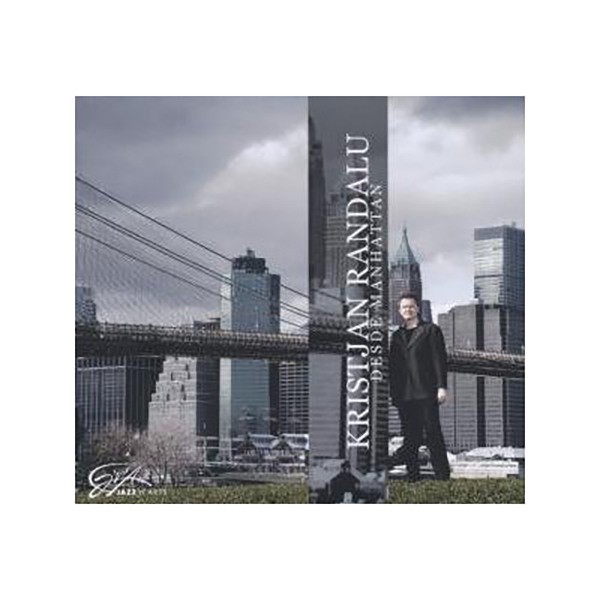
by Ian Mann
April 08, 2010
/ ALBUM
Pianist who deftly combines jazz, folk and classical influences to produce music that is inventive and quirky, adventurous yet melodic
Kristjan Randalu is an Estonian pianist who now divides his time between Estonia, Germany and New York. The son of two classical pianists Randalu studied in Germany and London before moving to New York in 2003. I first encountered his playing in his role as pianist with the Transatlantic Collective, an alliance of US and UK based musicians co-led by bassist Michael Janisch and saxophonist Patrick Cornelius. The Collective’s show at Dempsey’s in Cardiff in the Autumn of 2009 is reviewed elsewhere on this site. It was there that Randalu was kind enough to give me a copy of this album for review purposes so my thanks to him for that and my apologies for not having got round to writing about it before now.
The album was recorded in Germany in late 2008 and released the following year. Randalu deploys an unusual core quartet line up consisting of himself on piano, Stephan Braun on cello, bassist Antonio Miguel plus long term associate Bodek Janke on drums, percussion and the occasional vocal. Singer Olivia Trummer makes a guest appearance on the final track “Teraz”.
The material consists of three originals by Randalu, four by Janke plus a version of Charlie Parker and Dizzy Gillespie’s bop classic “Anthropology”. The music is a fascinating mix of jazz, folk and classical influences and with Braun’s cello the principal solo voice alongside Randalu the group sound is highly distinctive.
Randalu’s performance in Cardiff left no room for doubt that he is a highly accomplished pianist with the technique of a classicist and the feel of a jazzer. “Desde Manhattan” is a stunning album that displays his abilities to the full and he receives excellent support from a hugely talented young band. The opening “Rignana”, a Randalu original quickly establishes the quartet’s identity. It has a gorgeous tune and the melancholy ring of Braun’s cello shares the honours with the flowing lyricism of the leader’s piano. Miguel and Janke supply sympathetic support with the latter’s imaginative percussion adding extra colour to an already rich sonic palette.
“Hinken”, also by Randalu is similarly attractive, a serpentine seven and a half minute epic, strong on melody but full of changing moods and motifs. There’s a lengthy pizzicato solo played by Braun on the cello I’d say but with apologies to Miguel if it’s actually him on the bass. In any event it’s highly musical, wholly enjoyable and hugely technically demanding I suspect. Randalu himself is lyrical and percussive by turns and the drumming of Polish born Janke is again wonderfully colourful.
Janke is no mean composer himself and his “Folksong” does just what it says on the tin with it’s catchy folk based melody the framework for some dazzling playing from all the members of the quartet. For the most part Braun and Randalu double on the melody line and there are fine solos from both with Braun particularly impressive as the music shades off into something more abstract. Miguel is featured on bass in the tune’s more lyrical moments. Like Randalu’s own compositions the piece is always unfolding, this is a group that thinks on it’s feet, handling the rapid changes of mood and tempo with considerable aplomb.
By contrast Randalu’s “Stiller Beobachter” is unashamedly romantic, a delicate ballad that shows Randalu and Braun at their most tender and lyrical.
I’m less keen on Janke’s “Trust”, another folk derived tune spoilt for me by Janke’s novelty vocals. The tune itself is enjoyable enough, stomping along in quirky, klezmer like fashion with Braun coaxing some remarkable sounds from his cello but the piece does seem rather at odds with much of the rest of the album.
The decision to undertake an interpretation of Gillespie and Parker’s “Anthropology” is perhaps a reflection both of Randalu’s love of jazz and his move to New York, birthplace of bebop. It’s certainly a remarkable version with Braun’s cello tackling Parker’s slippery, squiggling turbocharged alto lines. The piece also features a series of face -offs between Randalu’s piano and Janke’s drums. It’s bebop as you’ve never heard it before.
The album ends with two pieces by Janke. “Na Skalach” continues the drummer’s fascination with folk forms. The central melody of this sounds as if it could be Scottish or Irish but in typical Randalu group fashion the quartet soon move it somewhere else via Braun’s sawing cello solo over Janke’s skittering percussion groove. Randalu weighs in with a typically dazzling piano solo before the fade.
The wistful, drifting “Teraz” incorporates an Indian feeling courtesy of Janke’s tablas and voice with Trummer’s wordless singing adding an ethereal atmosphere to this essentially lyrical piece.
Randalu’s own playing is as eloquent and elegant as ever. His pin point production ensures a crystal clear piano sound throughout and as a musician his touch at the instrument is sublime.
“Desde Manhattan” is a high quality album with some fascinating writing and some brilliant playing all round. My main reservations would be that we don’t hear enough of Randalu’s own compositions and that the album loses focus in the second half as Randalu allows Janke to dominate proceedings. It’s a record that fires it’s best shots first and they’re very impressive shots indeed but the rest of the album is never less than good. On the whole this is a work that can be highly recommended, it’s inventive and quirky, adventurous yet melodic and despite the unusual instrumentation capable of a broad appeal, especially to piano fans.
blog comments powered by Disqus